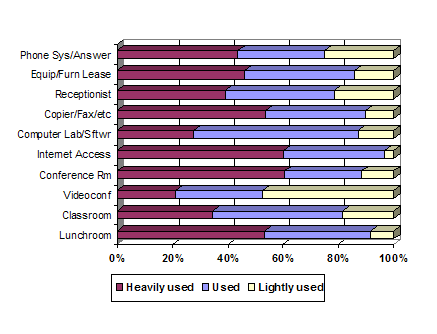
Incubator Services and ProgramsA key difference between a business incubator and a multitenant facility is the services and programs that an incubator offers to help small and start-up businesses grow and prosper. As part of the 2004 ARC survey, incubators in Appalachia were asked to indicate what programs and services they offer and how heavily they are used by tenants and other client companies. This section describes the results of that portion of the 2004 ARC survey, makes comparisons with other surveys and studies, and offers conclusions about services and programs in Appalachian incubators. Basic Office ServicesOne category of services provided by business incubators is basic office services: phone answering; access to shared conference rooms; reception areas; access to copiers, fax, and Internet services; equipment and furniture lease; lunchrooms; and classrooms.The 2004 ARC survey asked Appalachian incubators to indicate which basic office services they offered and how heavily they were used by tenant companies. Figure 6 indicates which services are most often offered by Appalachian incubators. The most commonly offered basic office services are conference rooms (offered by 100 percent of survey respondents), photocopier/fax (96 percent), Internet access (91 percent), and lunchrooms (86 percent). The least common basic office service offered by the 2004 ARC survey respondents is videoconferencing, offered by only 28 percent of Appalachian incubators. Figure 6. Basic Office Services Offered by Appalachian Incubators 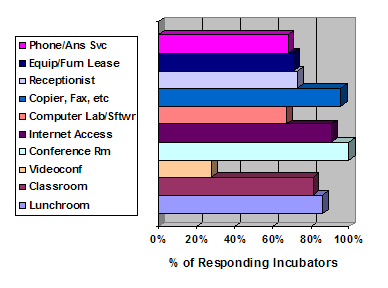
These data suggest that Appalachian incubators provide "the basics" of incubator services, which are common areas like lunch and conference rooms and office equipment, but they also provide modern telecommunications capabilities through the Internet. The lack of videoconferencing capability is expected, given both the cost and the rapid changes in technology that may not make it realistic to provide this service. (Another factor is demand for this service, which is addressed next in this subsection.) One surprise, however, is that phone systems, answering services, and related receptionist services are provided by only 75 percent of Appalachian incubators. A receptionist can play a very important role in helping tenants handle incoming calls, greeting and directing visitors, and facilitating the receiving and sending of packages. The only explanations we have for the lack of receptionist services are budgetary limitations or a view by some incubators that the receptionist role is expendable due to the widespread use of cell phones and voice mail in the business community. Figure 7 takes the analysis of basic office services provided by Appalachian incubators an important step further. This figure presents how heavily the various office services are used by tenants of these incubators. This figure does not consider how many incubators offer any particular office service (see Figure 6), but instead indicates how heavily each service is used among the incubators that do offer them. Figure 7. Usage Level of Basic Office Services The first portion of each bar indicates the percentage of incubators whose tenants heavily use the service, the middle portion indicates moderate use of the service, and the far right side represents light use. The basic office services that are most heavily used by tenants of Appalachian incubators are conference rooms and Internet access, with both being heavily used by about 60 percent of the tenants of the incubators that offer these services. The lunchroom and photocopier/fax machine services also are heavily used by more than 50 percent of the tenants of Appalachian incubators that offer these services. The least-used service is videoconferencing, with only about 25 percent of tenants heavily using this service and more than 40 percent using it only lightly, again among the incubators offering videoconferencing. Several conclusions can be drawn from these usage levels and the availability of these services:
Business Assistance ServicesA second category of services provided by incubators is business assistance. This includes help in areas like accounting, legal issues, and international trade.Respondents to the survey were given a list of business assistance services and asked to indicate (a) which they offer, and (b) how heavily they are used by the incubator tenants. The categories were consistent with those used in the original 2001 ARC incubator survey. Figure 8 indicates which business assistance services are most frequently offered by Appalachian incubators. All but one of the incubators responding to this survey question said they offered networking activities and assistance, and all but five help tenants and clients access loan funds. Other services that are frequently offered are marketing assistance (88 percent of respondents to this question), and mentoring programs (85 percent). Figure 8. Business Assistance Services Offered by Appalachian Incubators 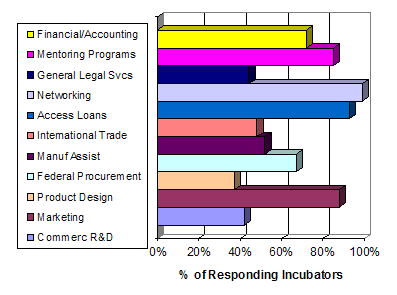
In contrast, product design assistance is provided by only 37 percent of incubators responding to this question, and commercialization research and development (R&D) assistance is found in only 42 percent of the Appalachian incubators. It can be argued that the need for these two services is somewhat limited to particular types of incubators in certain markets. However, the same cannot be said for general legal services, which are provided by only 44 percent of responding incubators. It is assumed that relatively few incubators provide these services because they lack access to legal expertise through their staffs, boards of directors, or service provider networks. Table 5 compares the number of Appalachian incubators that provide each of the business assistance categories in the original 2001 ARC survey and the latest 2004 ARC survey. In every category, there has been an increase in the number of incubators offering business assistance. Two possible interpretations of this can be offered, both of which result in positive assessments of business incubation in Appalachia. First, incubators in Appalachia are offering more business assistance services over time, which increases their value to the community and entrepreneurs. Second, while some incubators in the 2001 survey are no longer in operation, they have been replaced by new incubators in the 2004 survey that are providing more services to their clients and tenants.
A similar comparison can be made between the percentage of respondents to the 2004 ARC survey that offer various business assistance services and the respondents to the 2002 NBIA State of the Incubation Industry study. As shown in Table 6, the Appalachian incubators tend to offer the same services as the respondents to the 2002 NBIA national study.
Appalachian incubators were also queried about the level of use of each business assistance category by incubator tenants and clients. Figure 9 indicates three levels of use, ranging from heavily-used to lightly-used. These data suggest that the two business assistance services most often offered by Appalachian incubators (networking and accessing loans, per Figure 8) are also the two categories of services that are most heavily used by incubator tenants. The business assistance services that are only used lightly include international trade, product design, and manufacturing assistance. The other category that is lightly used is general legal services, which perhaps helps explain why relatively few Appalachian incubators offer this category of business assistance. Figure 9. Usage of Business Assistance Services 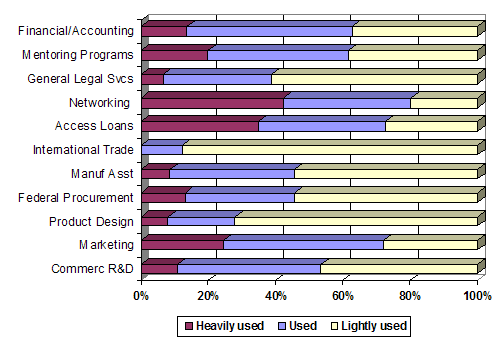
One interesting conclusion that can be drawn by comparing Figure 9 with Figure 7 is that the basic office services like conference rooms and copier/fax access are in general more heavily utilized than the business assistance services like networking and assistance accessing loans. Some of this difference may be explained by the fact that basic office services may be used on a regular (even daily) basis, whereas business assistance services are more likely to be needed on an irregular basis. This does not mean that business assistance services are not as important as basic office services, but it does suggest that incubators need to provide "the basics" as well as more sophisticated business assistance services if they want to meet the needs and expectations of clients and tenants. In conclusion,
Entrepreneurial TrainingRespondents to the survey also were asked whether they offer entrepreneurial training and, if they do, the source of the training curriculum. More than two-thirds of the respondents (68 percent) indicated that they offered entrepreneurial training.Of those incubators offering training, more than half use courses or workshops that have been developed locally (see Figure 10). The other half use nationally recognized or regionally developed training. Of those that use national training (a total of 15 incubators), there is no single dominant source: 40 percent of these incubators use FastTrac, another 40 percent use NxLeveL training, 13 percent use REAL Enterprise, and 7 percent use National Foundation for Teaching Entrepreneurship. Figure 10. Source of Entrepreneurial Training 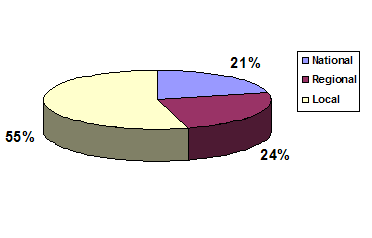
The following conclusions can be drawn from these data and analyses:
| ||||||||||||||||||||||||||||||||||||||||||||||||||||||||||||||||||||||||||||||||||||
